Hacking your career
Heads Up!
This article is several years old now, and much has happened since then, so please keep that in mind while reading it.
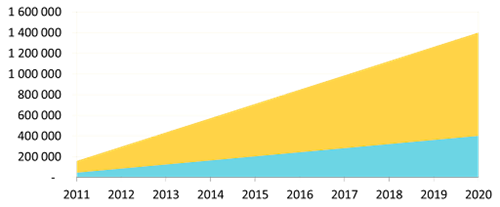
‘Thanks to’ pandemic also, the remote job become sexier than it ever was. As a remote worker who does it for 10+ years already (before it was cool ;)), I knew how it can speed up the general adoption and flow of professions around the globe. And it did. We can now both find the best talents from around the World for our companies and teams and apply for the job openings that weren’t even available for us e.g. due to the localisation limitations or other factors that pandemic bypassed.
All of it created also some sometimes unwanted and yet uncontrolled side-effects. Finding good people became like a Squid Game where candidates disappear (hopefully not die ;)) and in some cases they made companies lose during the game too. People’s expectations are changing - as if now they could potentially work for startups from Sillicon Valley when living in less expensive areas of the Globe - why not earn or expect the same pay as others within the global market competition now? I see it from both perspectives as a business owner and B2B contractor as well. And I still believe it all helps for us, as nothing speeds up the market better than a fair and at the same time crazy competition.
Crazy times as I’ve said. But it all opens the game for us all here. The game in which we need to have the desire to play in and if we will play it, why not have some ‘EXP’ already applied there? This is where we can hack our career and invest in it upfront. To make us stand out from the crowd and take the pole position in front of the others who didn’t want to step up.
When will the bubble blow up? Will AI replace us?!
I'm very sceptical about it, and I often hear the question, "Will [AI / low-code / no-code / {something_else}] replace developers?". Well, I always illustrate my answer with a famous quote (sourced from Twitter):
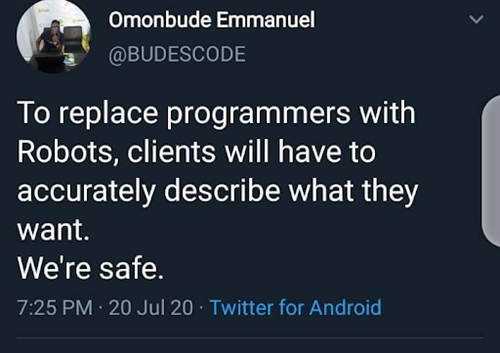
And yes, we’re safe. For now. But I’m also completely sure that the job we’re doing now won’t be the same in a couple of years. It’ll be different.
So we also need to be prepared for it ideally. Even if now almost everyone who can type and understands some of the code concepts can find the job for themselves, it won’t be enough soon to be a developer. ‘Just’ a developer. And this is what I truly believe in.
I recently read an interesting book by Simon Sinek called “The Infinite Game”. “In infinite games, like business or politics or life itself, the players come and go, the rules are changeable, and there is no defined endpoint. There are no winners or losers in an infinite game, there is only ahead and behind.” So I want us all to turn our developer's careers into infinite games where we do not compete with each other who is better, who can write the most efficient piece of code or who can code for longer hours during the day.. But the game in which we all enjoy what we do, help each other and become visible and found - for people who may look for us.
My (short) story as a Proof-of-Concept
I've attended 2 official job interviews in my life - both during my studies, in my 3rd year at the university. I failed both and didn't get the job in the end. It wasn’t a problem for me then as basketball and parties were still more important for me than my career, but I think it pushed me to some different direction already (not that I also realised then I won’t make the career in the NBA unfortunately…).
I joined the .NET group at my university and started to visit local meetups oriented around the various technologies that were interesting to me at the time. As still, it wasn’t anything ‘big’ then, it became completely natural for me that if I’ll learn something cool I can share it with a friendly bunch of people who might not know it and save some time for them finding out the path/solution for some problems. This is what we all did then anyway. So I learned, shared my knowledge and then learned more new, crazy things. At some point, during the .NET group meetup, I saw the opportunity of the internship at Microsoft. It was all about sharing Microsoft tech stack knowledge across the high schools around the whole country here in Poland. BTW this is also how I found out about Umbraco CMS - Thanks Microsoft! It helped me to become familiar with public speaking, knowledge exchange, meeting people and building relations. And this was the most important set of lessons I could ever receive.
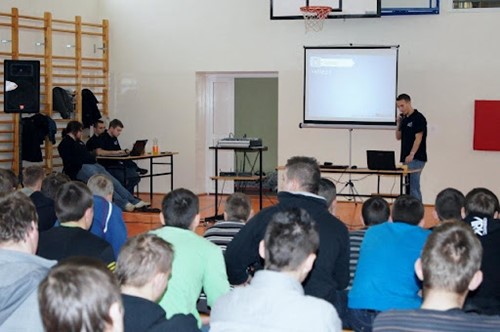
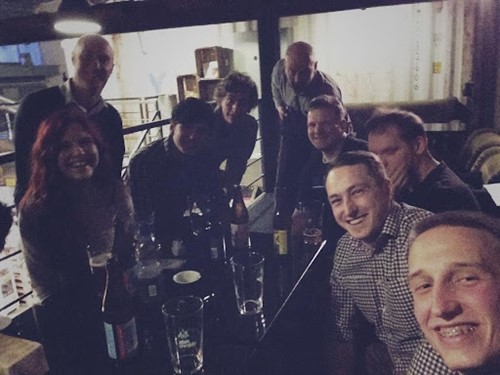
Find (and stay) yourself
- https://www.16personalities.com/ - A free, online personality test that only takes about 10 minutes!
- Gallup’s CliftonStrengths Assessment - Paid, online talent assessment discovering, measuring and analyzing the talents we all have and reporting our strengths and weaknesses extremely well!
- DISC Assessment - Finding the self-concept defined with four factors: Dominant, Inspiring, Supportive and Cautious.
- Reflected Best Self Exercise - A little bit more complex and time-consuming exercise, that is based on the people’s surveys around you can build the ‘best’ view of you for further processing and usage (I still plan to do it for myself!)
Burnout(s)
- Is it a tough project/client that stressed me for a longer period of time?
- Is it a relationship with a colleague(s)/manager(s) that makes me feel bad or wrong?
- Is it me and my life circumstances that made an impact on my work?
- Is it really a burnout at all or do I just have a bad day or a couple of days maybe?
Different perspectives
Stepping beyond the code
Becoming a part of the community
How you can join the community?
- Twitter (+ other social media) - Follow the #umbraco hashtag or people within our community and see what they are up to. Interact (this is the most important!) and share your activities by tagging with appropriate hashtags too.
- Slack / Discord - Community and official HQ channels of direct communication - ask/answer questions, discuss, meet new people
- Stack Overflow, Reddit, Hackernews - A little bit wider community and possibility to meet like-minded people and learn about many interesting things from around the tech
- Events - In-person or online meetups, festivals, conferences etc. - join one or many, get recognized and visible, learn from others and submit your talk ideas if you have anything interesting to share too!
- Github - The whole idea of open source software allow us to analyse, learn and share the code bits between each other. Treat it as your 2nd CV and push whatever you’re exploring, hacking, finding useful + search for interesting projects you can learn from and/or contribute to!
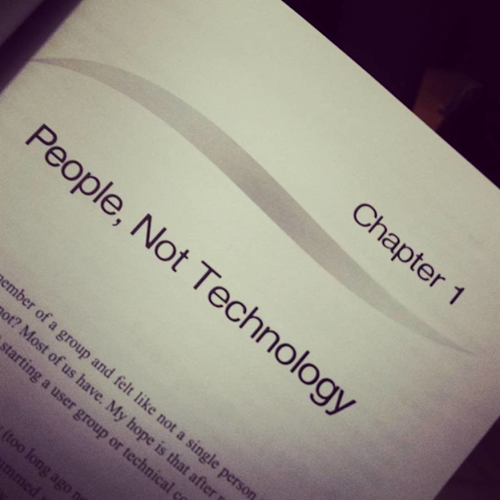
Building personal brand
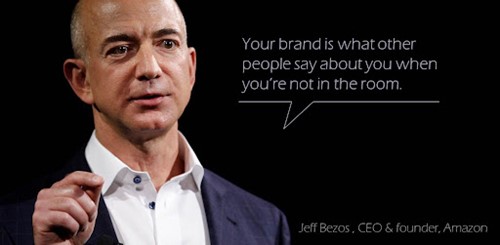
- Blogging / vlogging / podcasting / live-streaming - You don’t need the best equipment in the World to kick-off the online live discussion with your colleagues and reach out to some of your friends interested in the same topic. You might have heard about #umbraCoffee 😉 Same with your blog - Medium, dev.to, hashnode and similar platforms allows you to almost immediately type something and publish it to the web.
- Public speaking - meetups, conferences again - You can promote yourself, your company, your skills and niche, while visiting many interesting places and meeting great people.
- Hackathons and social activities - Usually non-profit, but also with many rewards, giving a chance to show off your problem solving skills, ability to work under the time pressure etc.
- Teaching others - E.g. via tutorials, online courses or offline workshops.
- Open source contributions and community participation.
- Forum activity and help/knowledge sharing on platforms earlier mentioned (StackOverflow, Reddit, Quora)
- Social media activity / knowledge sharing
- More...?
Understanding business & translating business into code
Becoming a 'devpreneur'
- Ads! - Paid posts/stories/fleets, mentions, crosses and so on. Opportunities are everywhere. Starting from the interest of companies to get many micro-influencers to promote their products and ending on collaborations with influencers agencies who are seeking for the companies and money for the “big players” out there. And it’s easier than you think, because companies are desperately looking for people like that to promote their products. You may find many groups on Facebook or forums where there are two ways of setting up contracts like that. By having a proof that you’re reaching a specific group of people and by selecting a brand which you’d really recommend for your followers, you might end up with a pretty decent collaboration and tons of gadgets to be tested and possibly used + solid amount of money if you’ll start reaching a proper amount of people via your profile/brand. I won’t be bringing concrete amounts of money as it’s changing, but generally, it can be even a couple of hundreds of dollars per post or thousands for a campaign for example. Not bad if you’re e.g. using and enjoying the products which you’re promoting. There is also another danger here that I don’t want to address at this stage, but generally: balance is a key as you hopefully don’t want to become an ad space or stand where everyone can throw their flyers and promotional materials. Trust is essential, so be careful with it and be always honest and direct in your reviews and promotions.
- Ambassadorship of product(s), service or technology - There are many cases where manufacturers, as in sports or general show-business, are signing up contracts with influencers and people with a reach to ensure they are promoting their products wherever it’s possible. It might be a keyboard producer (see e.g. Vortexgear company and their promotions on Instagram), software company (HIGH 5 GitKraken!) or even a whole hardware brand like Lenovo - and their #LenovoIN programme for brand ambassadors who they call Lenovo Insiders (@LenovoIN). By having a dedicated person who is their brand ambassador, they are feeling safe that the message and recommendation of the gear, tool or whatever else they are selling will be delivered to the right target group. Win-win.
- Affiliates - When you have a solid following base and people who are either interested in what you’re doing, it’s common that they are asking you about the tools you’re using, training you’re recommending and even hardware you own and use. It all depends again on the platform you’re on, context and activity you’re doing and promoting. Many producers and companies are offering affiliate programs for influencers and sellers who are in charge of getting them direct clients in exchange for e.g. % fee/commission for each transaction. It might not be a perfect and only source of income for even the biggest profiles and influencers - remember, you’re still selling something that is not yours - but it’s a great additional, passive income that might be nicely coupled with your mission and activity.
Let’s think about e.g. YouTube and videos you’re doing. If you’re using a specific gear, even for recording your videos, you may want to attach a small extension of your video description with some links to Amazon products such as a camera, laptop you’re using, additional gear and so on. If it’s something that you really recommend or anyone asked you for it - it won’t hurt anyone, but may help your audience = they will immediately know the answers for the questions about your equipment, and you = as you’ll get a pay check every time when someone from your audiences will decide to buy things using your recommendation. I mentioned Amazon, as it’s extremely easy to set it up and many YouTubers are already using it on their channel!
Some software companies and creators are doing the same approach. Tools like Leadpages (for building lead pages from pre-existing components), Wes Bos with his programming courses, Restream tool described in the YouTube section in this book and many many more are utilising this model and relying on some good people, happy from using their services that much, that they decide to promote it and become their sellers and ambassadors.
I personally used a couple of affiliate links, but I’d never do it without trusting in products I’m recommending and I’ll never treat it as a single source of income - as the truth is that these commissions are not that extremely high ;) If you’re happy from using some tools, products and you’re e.g. asked about them or recommending them often to your colleagues or friends - ask the company/manufacturer if they don’t have any existing affiliate program as it may just help you both!
-
Consultancy and paid communities - The following step - in most of the cases caused by the effect of scale to deliver it to the wider audience - is to create the paid community with a space to discuss, share, advise and exchange knowledge and ideas.
Extremely powerful and popular tools to organise it in are:- Telegram / WhatsApp / Signal - as an instant messaging group with a free/paid access to them
- Slack with e.g. Wes Bos fan community as a great example with 60k+ members
- Discord - as it’s free and extremely easy to use
- Facebook Groups - with various types of the groups (e.g. Subscriber Groups), multiple settings to manage it and extremely cool ways to monetise access to themConsultancy and paid communities - By getting good and better than others thanks to the confirmation of the values and skills by the active and engaged community around you, you can start selling yourself as an expert in the area of your expertise. Give some hints and tips for people “one step behind you”. And depending on the availability in your calendar and the number of clients - you can wind up your stake to the level which might be extremely satisfying. Still - it’ll be a service in which you’re selling your time, but many people feel better when they are on their own and it might be one of the first steps to achieve this mission.
- Own products - online and offline/retail - Definitely the best (most effective) and the hardest one. Because releasing and selling your own product is not easy in most cases. But there weren't better times to become a creator, teacher, mentor, author than now. People are always looking for new knowledge and there are always people who don’t know something you know and the other way around. Our profession is extremely interesting for many people right now. During the COVID-19 pandemic, when people started to lose their jobs and our industry was still hiring and helping many others to survive by switching to the online world, a lot of people had an idea to maybe dive into it and change their life. Also from a financial perspective, own products are the best way to scale your profits and release you from being dependent on selling your time. Social media and community building around you may help even find the idea for the product itself! So if you’re going to e.g. teach people Python or Event Storming technique or anything else - even not IT-related - think ahead in time how and if you want to scale it before it’ll be a must.
Why is it so hard? Because besides creating a product you also need to care about selling it. And it requires some marketing skills, negotiations skills and even business knowledge to set up appropriate pricing, model, strategy and so on. You’d be surprised how hard it might get when it comes that you need to put an enormous effort to reach people who are potentially interested in your product. And I’m not even talking about the technical part of the sales pipeline here. Community helps and again, if you’ll have good people around you, you’ll also have the best advisory board with you who can answer your toughest questions, help you choose the paths of evolution of the product and promote it across their circles.
What kind of products can you create and distribute (as a programmer)?
Ebooks / physical books
Before writing my book I’d say it’s the easiest and simplest way to create your first product. But it’s not and we all need to admit that writing is also not for everyone. And it’s tough. But still, it’s a great way of monetising knowledge that is not that demanding form. As still - content is king - and we'll learn new things and solve our problems by buying some ebook or book from a creator who knows what he/she is talking about - why not do it?
You can pack your knowledge from a specific topic or topics, pack it up in the document and either hire some freelancer from e.g. Fiverr to make it look beautiful or not and start distributing it.
Training and courses
This is my favourite and probably the most explored product type. In one of my businesses - a programming school for children WOW School - we’ve released dozens of online programming courses for children even “before it was cool” thanks to the COVID-19. Looking at it from a time perspective, I knew it'd be a good choice to switch to online courses. But then, in 2019, it wasn’t an obvious choice yet. We’ve been observing some pretty good campaigns with online courses for adults in various areas: business, finance, IT, programming or even piano! Maciej Aniserowicz, my mastermind fellow-mate, earned more than 10 million (!) PLN last year just from the sales of the online educational programs for programmers and marketers. Sick! Pandemic also proved that it’s possible to learn it even by children - assuming that products are made well and according to the target group. And anything is possible if you’re determined enough and driven from point A to point B by a good teacher/mentor.
The magic is in the scalability of it as once recorded course material can be sold many times in multiple campaigns, occasions or even constantly (but it’s not the best model just to tell you in advance). That’s the advance in comparison with offline training usually organised multiple times across the year, for a fixed and limited group of people and in the specific time frame - consuming the time of attendees and mentors as well. I believe that we’ll see more and more online training released by people like YouTubers and influencers as it’s not that explored area by them yet and it’s extremely beneficial - sometimes even more than various other income sources they are utilising now. Having in mind that long-term consequences of coronavirus will cause people to get used to the way of learning things online, we should also be in a good position to think about our material and programmes to teach other fellow developers something that we know at the moment.
Webinars and Conferences
If you’re ever attending a meetup or conference or even gone a step forward and doing a talk there, you can think about doing it live or recording it and selling it for a specific amount of money. There are various models of making paid webinars e.g. with a free option to attend it live and the ability to buy access if you missed it etc. Webinars are also great ways to collect emails and convert attendees into followers and clients of other products. You don’t need much to perform a solid webinar on a specific topic. Webcam, microphone, YouTube and e.g. StreamYard (also described herein the YouTube tools chapter) and the rest is in your hands/head! Again, the whole challenge is not in the webinar content itself, but in the registration and attendees group who will watch it after all. But here again, remember about your followers and use them to help you reach the audience you’re looking for.
Level up from a single webinar is a set of webinars or even an offline event/conference. Both might be extremely beneficial and can combine multiple authors, creators, programmers and people who want to share their knowledge. Think about combining multiple speakers with a huge reach to speak at a single event. Do you see potential here? Yes, they all will invite their people to check out the event and the reach is a combination of all their fans following them.
Gadgets - e.g. notepads, toys, stickers
A little bit different type of the product, but also interesting in terms of helping in boosting the reach and brand awareness. Some well-recognised brands and people from various industries decided to create e.g. their personal branded planners or notepads. There are also notebooks for UI/UX designers with responsive screens and options to sketch prototypes there. Why not do something similar for/by programmers? Anything that can be automated, delegated to the printing company or placed in the warehouse and sent to the people is an option here. Imagination is the only limitation.
Mateusz Kupilas (@JavaDevMatt, also the author of the Polish book “Junior Developer”) released a really nice and creative card game called “IT Startup”. He backed it with a Polish Kickstarter alternative - wspieram.to - campaign and reached 600% of his initial goal by raising more than 63k PLN for his first round of products in Polish. Then he started a global campaign with an English version of the game, directly on Kickstarter, and also made a great success by gathering 300% of his initial goal and more than 27k GBP raised.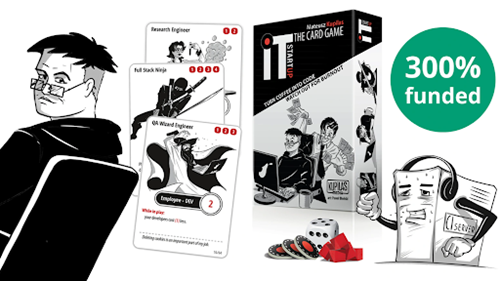
Last example here is a stickers pack from Wes Bos. I was amazed for the first time when I found it a couple of years back, but it just proves the solid community built around Wes’ activities and the training he offers. Various stickers (18 different designs last year), globally sold and shipped in packs to show support for Wes. Amazing. Every year he runs out of stock and all the receivers are bragging about them. Proving at the same time that being within the exclusive team is an added value for the product/sellers as well.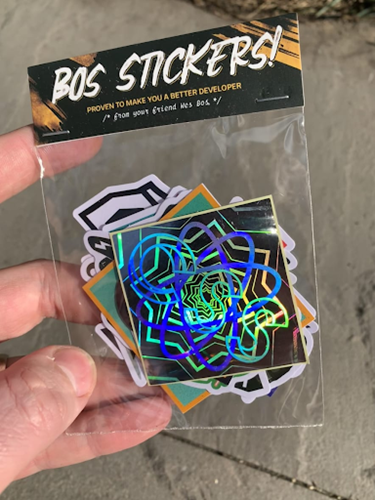
Clothes
Yes! Because even developers need to wear something from time to time ;) There are some stores run by devs and for devs such as DevHero or DVLPR who are successfully producing and shipping quality clothes with branding and designs resonating with our profession.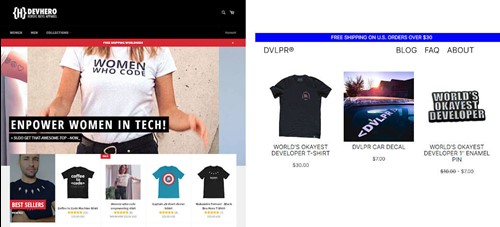
These brands are backed by solid personal brands and profiles active mostly on Instagram.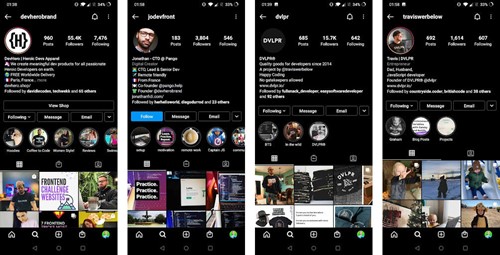
Selling merchandise became extremely popular across influencers and I still believe it’ll grow and if people will relate to the creators, they’d like to support them in many ways - By buying their clothes and other gadgets too. So if you’ll have creative ideas and grow your brand to the levels of some kind of “popularity” (damn, I hate this word) - you might want to think about it as well!
Software
I almost forgot… we’re developers, so we can also sell code. Indirectly, because in the form of a software product, but still ;) And yes, even now it’s still a good opportunity to help others and convert it into a sustainable business. It doesn’t matter if it’ll be a SaaS (Solution as a Service) offering, running on the cloud and being already extremely scalable, mobile, web, desktop or a console app doing automated Instagram or Twitter actions. We’re programmers, we can do everything, right? Find your niche and talk with the people there. Ask them about their problems and think if you can solve them by e.g. an application. If you love coding and you know how to build complete products - that’s an amazing opportunity (thanks to the social media presence and relations) - to have free beta testers, advisors and early users!
Final words
Despite the current checkpoint of your career, plans, goals or lack of it too - Allow yourself to be egoistic and ego-centric sometimes and think more about ‘YOU’ in general. You’re your own hacker and builder. You can tweak some of your bottlenecks, optimise the legacy parts of your system and install some new drivers and 3rd party tools to still operate and run your daily tools to achieve what you want to achieve in your life. Don’t be afraid of taking responsibility for it too. If you fail, you fail. My 11 months old daughter fails more than 100 times per day and I don’t think she will stop trying to learn how to walk tomorrow ;) You shouldn’t either. Never stop learning and exploring. Web 3.0, Metaverse, NoCode/LowCode are not only buzzwords, but also opportunities. Remember what were the key takeaways from the “Range” book - The specialised world is overrated and the power is in the general understanding of the bigger picture. “Stay hungry, stay foolish” as Steve Jobs said and pivot/change when you’ll feel bored or not challenged anymore.
And last but not least - Don’t feel obligated to do anything about it. Take the leap and risk only if you’re fully conscious about it. As with the great power comes great responsibility… and cost/pain also. It’s the constant and “Infinite Game” of priorities amongst work, life, family, spiritual life and health as well. One can take out another and in the race for the better career, we can lose a lot of small races and small wins as e.g. more time spent with the family, children etc.
Troy Hunt once said during his talk about the similar topic that he needed to decide to skip his son's birthday and spend it via Facetime while he was travelling with his talks around Europe (he is based in Australia). Always something for something, so I hope and wish you only good decisions and career steps and choices. Share your journey and stay ambitious!